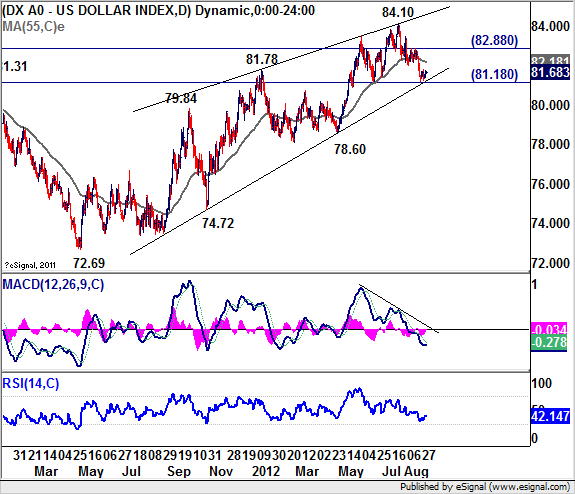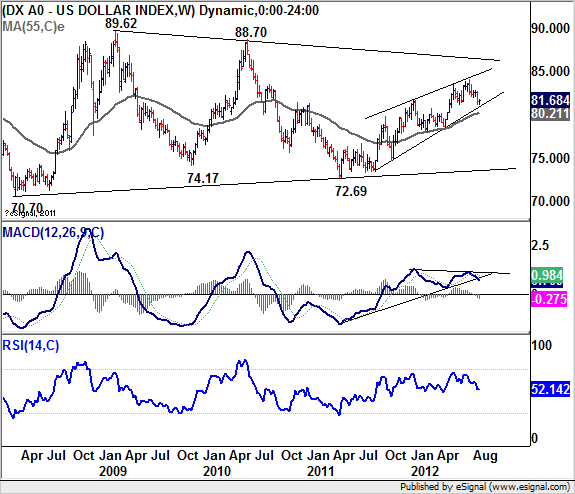The dollar and yen were both lifted mildly by risk aversion as investors lightened up their position on risk markets ahead of Bernanke's speech. S&P 500 has indeed pulled back to close below 1400 level for the first time since early August while Dow barely closed at 13000.71.
The kiwi and aussie are the worst performing currencies this week and the current market sentiments. But European majors, yen, and even Canadian dollar, managed to stay in range against dollar so far. Technically, the Dollar Index is still holding on to an important support level at 81.18, as well as a medium-term rising trendline. Today's speech from Bernanke would be key to determining dollar's overall direction.
Fed chairman Bernanke will deliver a speech titled "Monetary Policy Since the Crisis" at 1400GMT today at the Jackson Hole Economic Symposium. All eyes will be on hints of QE3 or any other form of stimulus. Expectations had built up after FOMC minutes for August meeting revealed that "many members judged that additional monetary easing would likely be warranted fairly soon." However, some pointed out that Bernanke could refrain from giving any clear guidance as firstly, the message was already delivered in FOMC minutes. Secondly, there are big event risks ahead in European in September, and there will be elections in US later year.
Instead, Bernanke could just opt for focusing on the lessons learned since the current framework was laid out two years ago. And this week's retreat in risk markets argue that investors are indeed not too convinced that Bernanke will deliver something significant. It's just a couple of hours away and we'll wait and see.
In the eurozone, Spanish PM Mariano Rajoy said after a meeting with French President Francois Hollande that Spain would not request further assistance until "it's known exactly what's on offer." However, the country is running short of money and a Valencia official recently stated that the region will need another 1B euro from the regional liquidity fund. Meanwhile, an Andalusian official said that his region might need to make a similar request soon.
An ECB member Joerg Asmussen from Germany insisted that ECB would only act in parallel with the EFSF/ESM and only short maturity bond would be purchased. He also required involvement of the IMF in setting conditions of new bond buying. According to Asmussen, in his opinion, "the IMF will be involved in setting the economic adjustment programs because the IMF of course has unique know-how and has high leverage as an external policeman in these cases."
On the data front, UK Gfk consumer sentiment was unchanged at -29 in August, missing expectation of -27. Japan PMI manufacturing dropped to 47.7 in August. Unemployment rate was unchanged at 4.3% in July, household spending rose 1.7% vs expectation of 1.2%. Tokyo CPI core dropped less than expected by 0.5% in August while national CPI core dropped -0.3% yoy. Industrial production dropped -1.2% mom in July while housing starts dropped -9.6% yoy. German retail sales unexpectedly dropped -0.9% mom in July. Looking ahead, eurozone CPI flash and unemployment, Canada GDP, US Chicago PMI, factory orders and U of Michigan confidence final will be released.
The Dollar Index remained soft this week but nonetheless, is holding on to 81.18 support as well as the medium-term trendline support. There is no confirmation of reversal yet. And indeed, whole up trend from 72.69 could still extend to a new high above 84.10 if the Dollar Index could defend 81.18 support level successfully. And, break of 82.28 resistance will indicate that such up trend is finally resuming.
Nonetheless, as pointed out before, decisive break of 81.18 and the trend line will indicate that whole medium term rebound from 2011 low of 72.69 has finished. And in that case, much deeper decline would be seen ahead for 78.60 support and below. As bearish divergence is seen in weekly MACD, we're leaning towards neither case for the moment and will stay neutral until a breakout.


The kiwi and aussie are the worst performing currencies this week and the current market sentiments. But European majors, yen, and even Canadian dollar, managed to stay in range against dollar so far. Technically, the Dollar Index is still holding on to an important support level at 81.18, as well as a medium-term rising trendline. Today's speech from Bernanke would be key to determining dollar's overall direction.
Fed chairman Bernanke will deliver a speech titled "Monetary Policy Since the Crisis" at 1400GMT today at the Jackson Hole Economic Symposium. All eyes will be on hints of QE3 or any other form of stimulus. Expectations had built up after FOMC minutes for August meeting revealed that "many members judged that additional monetary easing would likely be warranted fairly soon." However, some pointed out that Bernanke could refrain from giving any clear guidance as firstly, the message was already delivered in FOMC minutes. Secondly, there are big event risks ahead in European in September, and there will be elections in US later year.
Instead, Bernanke could just opt for focusing on the lessons learned since the current framework was laid out two years ago. And this week's retreat in risk markets argue that investors are indeed not too convinced that Bernanke will deliver something significant. It's just a couple of hours away and we'll wait and see.
In the eurozone, Spanish PM Mariano Rajoy said after a meeting with French President Francois Hollande that Spain would not request further assistance until "it's known exactly what's on offer." However, the country is running short of money and a Valencia official recently stated that the region will need another 1B euro from the regional liquidity fund. Meanwhile, an Andalusian official said that his region might need to make a similar request soon.
An ECB member Joerg Asmussen from Germany insisted that ECB would only act in parallel with the EFSF/ESM and only short maturity bond would be purchased. He also required involvement of the IMF in setting conditions of new bond buying. According to Asmussen, in his opinion, "the IMF will be involved in setting the economic adjustment programs because the IMF of course has unique know-how and has high leverage as an external policeman in these cases."
On the data front, UK Gfk consumer sentiment was unchanged at -29 in August, missing expectation of -27. Japan PMI manufacturing dropped to 47.7 in August. Unemployment rate was unchanged at 4.3% in July, household spending rose 1.7% vs expectation of 1.2%. Tokyo CPI core dropped less than expected by 0.5% in August while national CPI core dropped -0.3% yoy. Industrial production dropped -1.2% mom in July while housing starts dropped -9.6% yoy. German retail sales unexpectedly dropped -0.9% mom in July. Looking ahead, eurozone CPI flash and unemployment, Canada GDP, US Chicago PMI, factory orders and U of Michigan confidence final will be released.
The Dollar Index remained soft this week but nonetheless, is holding on to 81.18 support as well as the medium-term trendline support. There is no confirmation of reversal yet. And indeed, whole up trend from 72.69 could still extend to a new high above 84.10 if the Dollar Index could defend 81.18 support level successfully. And, break of 82.28 resistance will indicate that such up trend is finally resuming.
Nonetheless, as pointed out before, decisive break of 81.18 and the trend line will indicate that whole medium term rebound from 2011 low of 72.69 has finished. And in that case, much deeper decline would be seen ahead for 78.60 support and below. As bearish divergence is seen in weekly MACD, we're leaning towards neither case for the moment and will stay neutral until a breakout.


